Starting Small: Tips For Creating A Sustainable Life in Japan
Adopting more eco-friendly habits while living in Japan isn’t as big of a challenge as it may seem
Saving the environment in one giant swoop seems like an impossible feat, but maybe it’s feasible if we start small. Here are some tips and philosophies for making lifestyle changes that you can sustain with ease.
On the heels of the global climate change strike that took place recently, and in the wake of Swedish activist, Greta Thunberg’s globally moving speech, it’s hard to not get involved in the eco-friendly conversation.
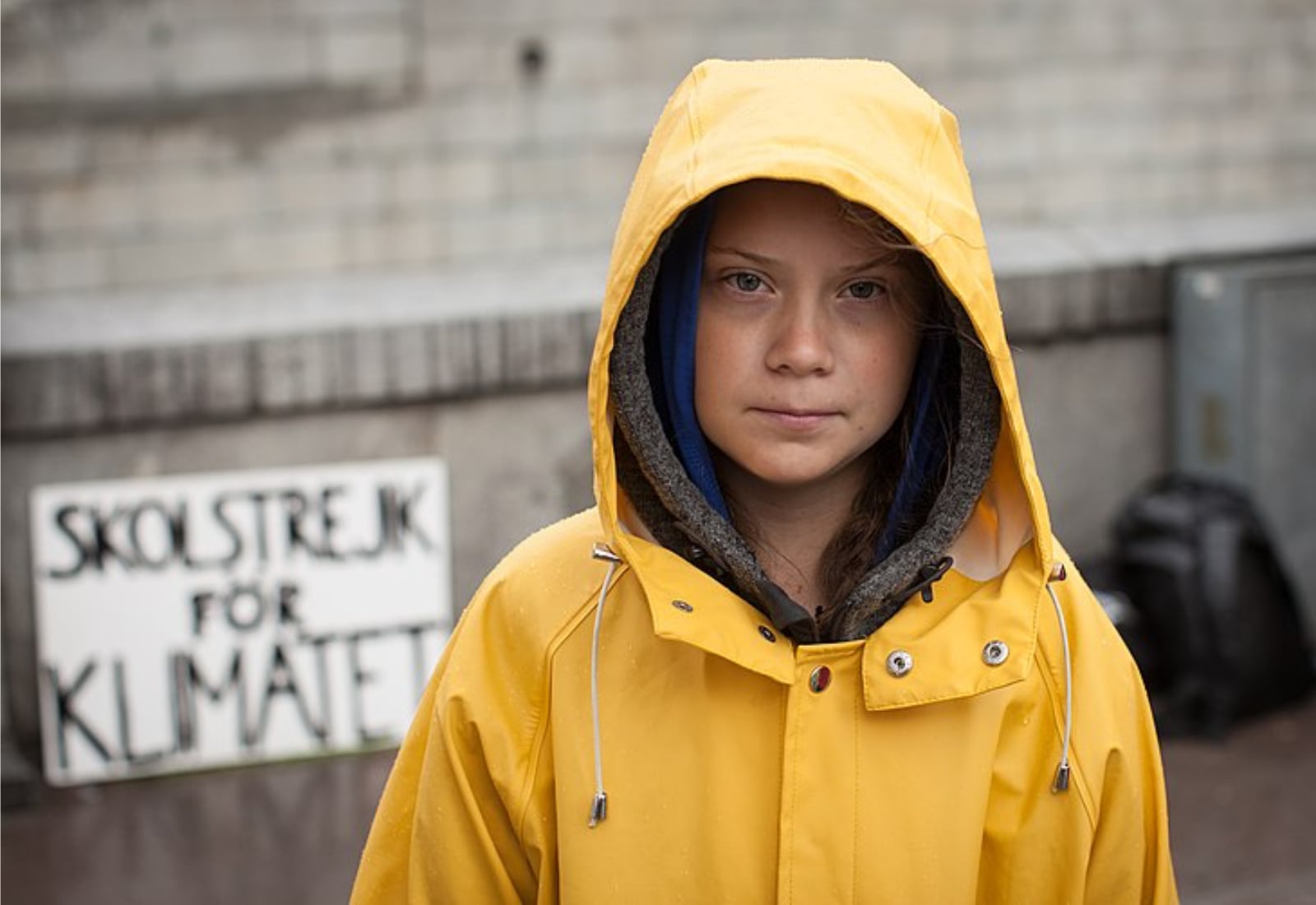
Greta Thunberg is at the forefront of the fight against climate change.
Just last year in August of 2018, Greta initiated a solo strike from school for climate change awareness. Today she stands with tens of thousands of people who are inspired, motivated, and ready for action. “I want you to act as if the house is on fire, because it is.” She boldly stated in a speech in January 2019 at the World Economic Forum.
In an effort to inform myself on actions I could take in Tokyo, I spoke with Robin Lewis of Social Innovation Japan and Deborah Vitali, Marisa Gelenscer, Pamela de la Fuente, and Karen Dawber of EAS-Y Green Group, two groups in Tokyo actively pushing for more eco-conscious changes. Both interviews were educational, unique, and perhaps most importantly, similar in their approach to impact real change for the environment of Japan. Their message? Start small.
We do not inherit the earth from our ancestors, we borrow it from our children.
They gave me the following tips to begin creating a more sustainable lifestyle in Tokyo. Small things that we can shift or change that may just begin to put out the fire. So, Tokyo, let’s look at our options.
The following interviews have been condensed, edited, and combined as if they’ve happened in one, lively, eco-friendly space.
1. Make use of the most powerful of the ‘R’ mantras: Refuse

According to an article that Robin wrote for Medium, Japan is second in the world for plastic “waste per capita” at a whopping 106 kilos, which is “more than China and the rest of Asia combined.” Despite Japan having a reputation for a country that has detailed and organized recycling procedures, a closer look at the practice shows that only about 30 percent of the recycled plastics are actually reused while the remaining 70 percent is incinerated.
So what’s the best thing we can do? “Refuse.” says Robin, this being the most effective of the ‘R’ mantras (refuse, reduce, reuse, repair, recycle).
2. Drink water from a reusable water bottle & use the MyMizu app
One of the most exciting and recent projects by Social Innovation Japan (SIJ) is the MyMizu app. The app is designed to help eliminate the need for plastic bottles by making it easy to refill water bottles when you’re out and about. MyMizu displays a map of Japan with over 8,000 refill spots at trendy cafes like About Life Coffee in Shibuya.
Robin expresses his excitement, explaining that, “[In Japan] we have the infrastructure, and we have the taps, and yet we have people who can’t refill their bottles.” This app solves that problem in a simple and fun way: it brings local businesses and the public together to use the existing infrastructure to access water instead of having people purchase another plastic water bottle from the nearest convenience store or vending machine.
3. Carry a reusable bag when shopping
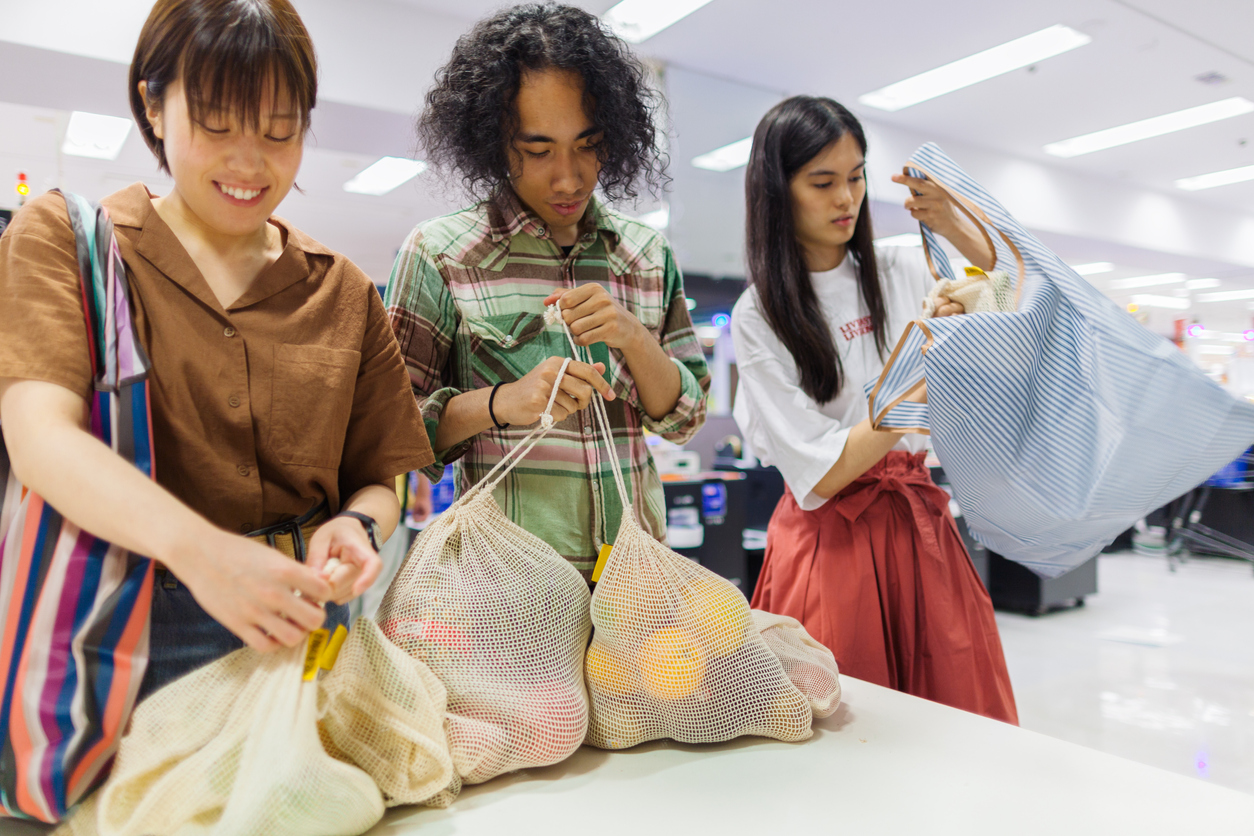
A light bag that’s easy to carry is your best bet. The cashier at your neighborhood grocery store may even praise you with an erai ne (much respect) and give you a small discount for not using the store’s plastic bags. I sought to find the coolest, most fashionable-looking reusable bag. I ended up rediscovering a canvas tote bag (extremely popular and trendy in Japan, by the way) I received at the Tokyo International Film Festival two years ago. It’s made of cloth and can easily fold into my backpack pocket when I’m not using it. A win for the environment, and a win for me.
4. Bring your own utensils (BYOU) & consider shops with no plastic options
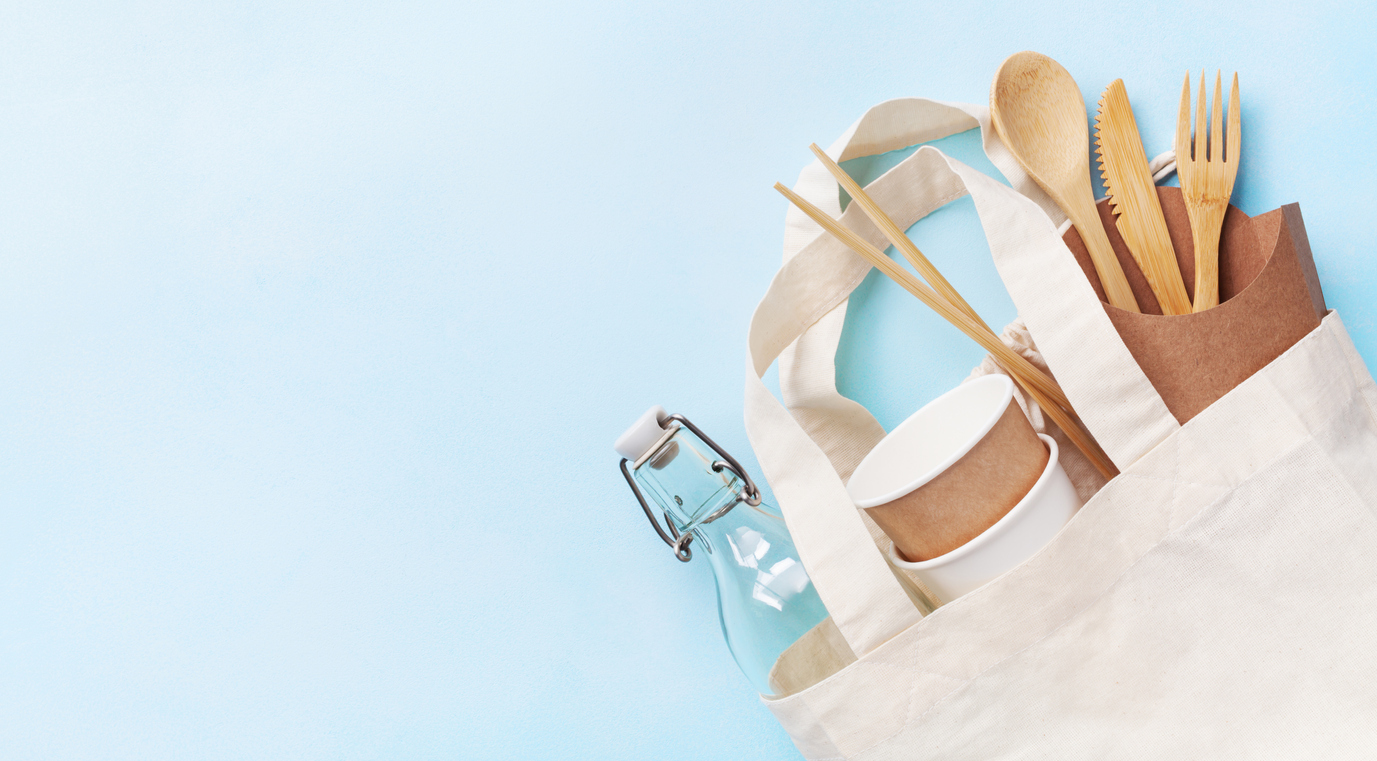
People in Japan love their coffee, and that inevitably means they love their Starbucks. The next time you want to chill at your neighborhood Starbucks cafe, ask for a mug instead of getting the to-go cup. The next level up is bringing your own reusable mug or tumbler if you’re on the go. Bringing your own lid for a to-go cup seems to be a new trend as well.
This goes for convenience stores as well. Almost everything is wrapped in plastic, even the plastic utensils are wrapped in plastic. Keep a set of reusable utensils in your bag or just skip the conbini all together and opt for a local bakery where items can be wrapped in paper.
5. Use beeswax wrap instead of Saran wrap (plastic wrap)
View this post on Instagram
Beeswax wrap is sustainable and long-lasting, and there is a place you can buy it right here in Tokyo, Eco-Hachi. The small business is made by none other than Marisa from EAS-Y Green. Not only does using beeswax wrap remove plastic from the whole equation, unlike Saran wrap which is single-use, beeswax food wraps can be used for up to a whole year.
6. Shop at secondhand stores (and save some money)
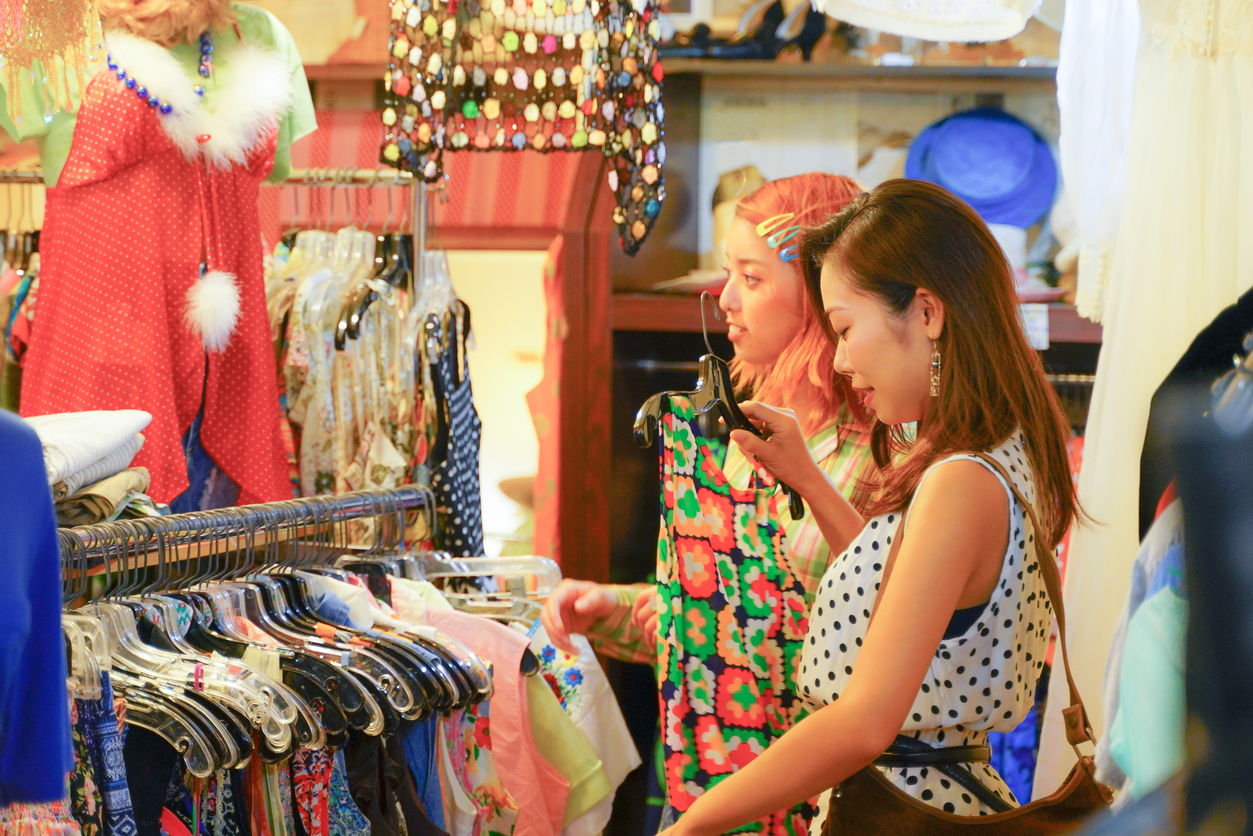
In Japan, secondhand stores like BookOff and 2nd Street have a plethora of quality clothes and goods that you can find for a lesser price. You can donate your clothes and goods to these locations instead of throwing them away. A majority of the world’s fashion market is concentrated in the US, China, and Japan, and according to an article by the Independent, the fashion industry is the second largest contributor to water pollution in the world, only second to oil. When clothes made of synthetic fibers are just thrown away, it can take up to 200 years to decompose. So the next time you’re thinking about perusing through the aisles of Uniqlo, consider a trip to Shimokitazawa instead for some secondhand shopping.
7. Research local farms nearby (some deliver!)
View this post on Instagram
Customizable door delivery is the most convenient invention since sliced bread. But delivery doesn’t mean you’re limited to fast foods; in Tokyo, you have the option to have farm-fresh, local foods delivered right to your door. Not only is this option a benefit for your health and well-being, but it’s also an economically sound choice that relies less on government funding and provides more community support for local Japanese farmers. Here are two resources you can look into right here in Tokyo: Ome Farm and Shunno Kitchen. (Coincidentally, some of Ome Farm’s products are sold at the small bakery near my place).
8. Share your new habits with friends and on social media

Believe it or not, we have a tendency to imitate the actions that others around us do. Keeping your friends and coworkers in the loop about your new habit on the top four social media platforms in Japan (Line, Twitter, Instagram, Facebook) can start a chain reaction. When you feel good about the change you’re making, it can inspire the people around you to want to do the same. You’re on your phone anyway—why not utilize it for something good?
Choose to adopt one habit today
We can all “start small” by choosing to implement a new habit and try to sustain it before adding another to the mix. Eventually, our new lifestyle choices will solidify into our everyday regular lives.
“There’s a famous phrase,” Robin says as he reaches for his phone. He reads aloud, “‘We do not inherit the earth from our ancestors, we borrow it from our children.’ Mind blown, right?” Yes, my mind was blown.
I am not immune to the allure of the midnight siren call of a conbini where mountains of gyoza, bentos, and other convenient plastic-wrapped items wait for me. And I don’t yet know to what extent I’ll be able to practice a sustainable, eco-friendly lifestyle, but thanks to these interviews I know there are other avenues I can go to get my fix and feel better about it. We all can.
A huge thank you to Robin from Social Innovation Japan, and Deborah, Marisa, and Pamela from EAS-Y Green for the above suggestions and very inspiring words.
What are your sustainability practices, small or not so? Comment here and let us know. Sharing is, in this case especially, caring.












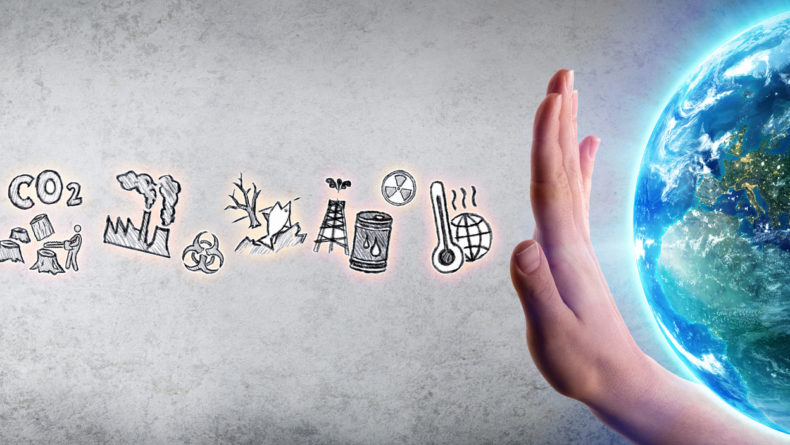
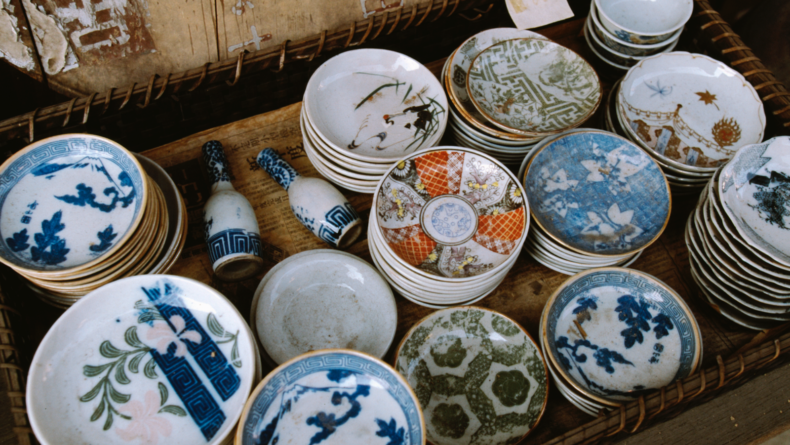
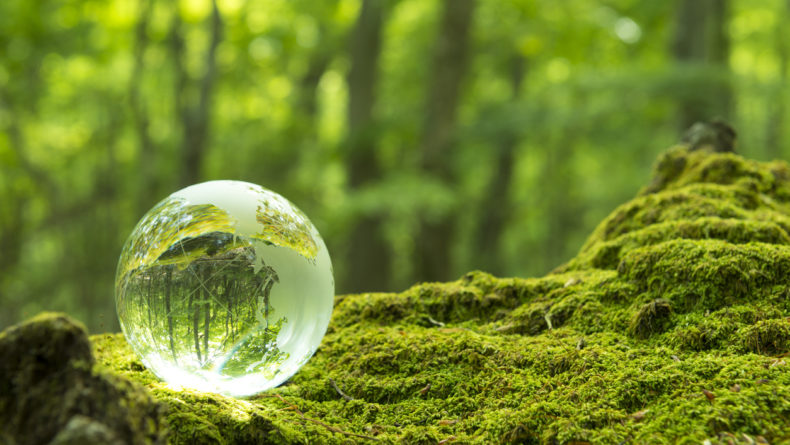

Leave a Reply